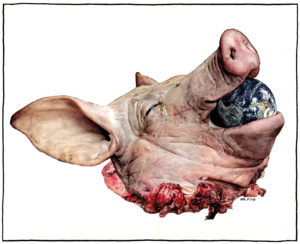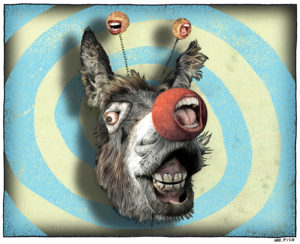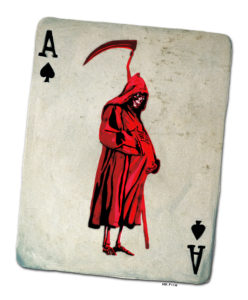A Poem Close to the Bone for Many in 2016
"I can tell something bad is happening in the world when my poem is surging,” says "Good Bones" author Maggie Smith.
A street of boarded-up homes in Columbus, Ohio. (Howard Jefferson / CC 2.0)
“Good Bones”
A Poem by Maggie Smith
Last summer, Maggie Smith — no, not that one — sat in a Starbucks in Bexley, Ohio, and wrote a poem. “Life is short, though I keep this from my children,” it began. Smith had no idea that she was setting down the first lines of a work that would seize the mood — and social-media accounts — of so many people in the tumultuous year that was 2016.
Three days after a gunman killed 49 people at the Pulse nightclub in Orlando, Smith’s poem, “Good Bones,” was published in the literary journal Waxwing. A reader moved by the poem’s message posted an image on Facebook, where a Brooklyn-based musician named Shira Erlichman read it and passed it along on Twitter. As the poem traveled across the web, its celebrity endorsements got bigger: Caitlin Moran, Glennon Doyle Melton, Alyssa Milano, Megan Mullally.
Soon enough, Smith, who will publish her third book of poems, “Weep Up” in 2018, was greeted by a friend in town who told her, “Oh, I just read your poem on Charlotte Church’s Twitter.”
Articles about the poem in The Guardian, Slate and elsewhere helped propel its spread. So, too, did shocking news: “Good Bones” spiked when British politician Jo Cox was murdered and again in the days following the presidential election. Nov. 10 and 11 were heavy with poetry on the Internet. Among the works most shared, according to the Academy of American Poets, were Maya Angelou’s “Still I Rise,” W.H. Auden’s “September 1, 1939” — and “Good Bones.”
It’s impossible to know how many people have read the poem, though one estimate in August put the number at nearly a million. The poem has been interpreted into a dance by a troupe in India, turned into a musical score for the voice and harp and been translated into Spanish, Italian, French, Korean, Hindi, Tamil, Telugu and Malayalam. Closer to home, Smith says that she has gotten many requests for the work to appear in church bulletins and for her to read it aloud. “It’s my ‘Freebird,’ ” she jokes.
“Good Bones” has become something of a societal anxiety barometer. “I can tell something bad is happening in the world when my poem is surging,” says Smith, a 39-year-old mother of two who earned an MFA at Ohio State and lives not far from where she grew up outside Columbus.
The poem is a heartfelt work that grapples with pain and injustice, with unfairness and disillusionment. “The world is at least/ fifty percent terrible, and that’s a conservative/ estimate,” it says. “For every bird there is a stone thrown at a bird./ For every loved child, a child broken, bagged,/ sunk in a lake. Life is short and the world/ is at least half terrible, and for every kind/ stranger, there is one who would break you.”
Its subject is whether, when and how to talk to children about these hard realities. “I was troubled by the question of how we teach our kids about the world without lying to them — telling them that it’s all good — and telling them the truth without scaring them.”
In the poem, the speaker takes on the role of a real estate agent: “I am trying/ to sell them the world. Any decent realtor,/ walking you through a real s—hole, chirps on/ about good bones: This place could be beautiful,/ right? You could make this place beautiful.”
The work, Smith says, sprang from a mother’s worry about what’s hard and unfair in the world, “and yet wanting it to be a good place for my kids to live in.”
Still, she has been wary of discussing the poem with her own children, who are 4 and 8. For Smith, the trouble is not so much the expletive but the idea “that half the world is terrible.” That’s a pretty bleak outlook for children younger than 10 to contend with, she admits. At the same time, she says, “I don’t want my kids to turn 15 and all of the sudden that idea drops in their laps. We have a responsibility to tell them the truth.”
Driven by this sense of purpose, Smith wrote the poem, finishing it nearly in one sitting, on a yellow legal pad in that coffee shop all those months ago. “I’m happy for the poem but not the circumstances of its popularity,” she says. “I wish I had written a poem that people share when babies are born or people get married.”
That said, she rejects the notion that the message of “Good Bones” is pessimistic. “I don’t think I could write a poem that the world is beyond repair,” she says. Even if the world may seem at times like a dilapidated house that only a fool would buy, it still “has good bones,” Smith says. “My hope is that the poem is a call to improve it anyway.”
Nora Krug is an editor and writer at The Washington Post Book World.
©2017, Washington Post Book World Service/Washington Post Writers Group
Independent journalism is under threat and overshadowed by heavily funded mainstream media.
You can help level the playing field. Become a member.
Your tax-deductible contribution keeps us digging beneath the headlines to give you thought-provoking, investigative reporting and analysis that unearths what's really happening- without compromise.
Give today to support our courageous, independent journalists.





You need to be a supporter to comment.
There are currently no responses to this article.
Be the first to respond.